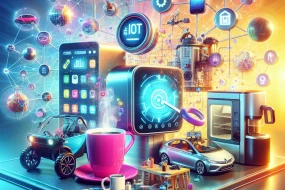
Quantum computing is no longer the stuff of science fiction. It's a burgeoning field that promises to revolutionize technology as we know it. But what exactly is quantum computing, and why does it matter? In this article, we'll delve into the basics of quantum computing, explain its potential applications, and explore the future it might shape.
Understanding Quantum Computing: The Basics
At its core, quantum computing leverages the principles of quantum mechanics to process information. Unlike classical computers, which use bits as the smallest unit of data, quantum computers use quantum bits or qubits. A qubit can exist in multiple states simultaneously, thanks to a quantum phenomenon known as superposition. This allows quantum computers to perform calculations at speeds unimaginable with classical machines.
Superposition and Entanglement: The Quantum Edge
Superposition isn't the only trick up quantum computing's sleeve. There's also entanglement, a phenomenon where qubits become interconnected; the state of one qubit can depend on the state of another, no matter the distance between them. This entanglement can exponentially increase the processing power of quantum computers, enabling them to solve complex problems much faster than classical computers.
Quantum Gates and Algorithms: The Building Blocks
Just as classical computers use logic gates to perform operations, quantum computers use quantum gates. These gates manipulate qubits through operations that change their probabilities. Quantum algorithms, such as Shor's algorithm for factoring large numbers or Grover's algorithm for searching unsorted databases, exploit these gates to solve specific problems more efficiently than classical algorithms.
Real-World Applications: Where Quantum Computing Shines
Quantum computing holds immense potential across various fields. In pharmaceuticals, it can simulate molecular interactions to speed up drug discovery. In finance, it could optimize portfolios and manage risks with unprecedented precision. Cryptography might be transformed, as quantum computers could break current encryption methods, necessitating new quantum-resistant algorithms. Even logistics and supply chain management could see improvements through optimized routing and scheduling.
Common Misconceptions: Quantum Computing Myths Debunked
Quantum computing is often misunderstood. A common myth is that quantum computers will replace classical computers entirely. In reality, they will complement them, handling tasks that are currently intractable for classical machines. Another misconception is the belief that quantum computing is just around the corner for everyday use. While progress is rapid, practical, widespread applications may still be years away.
Challenges Ahead: The Road to Quantum Supremacy
Despite its promise, quantum computing faces significant challenges. Qubits are notoriously fragile, prone to errors from environmental interference. Error correction is a major hurdle, requiring complex algorithms and additional qubits. Scalability is another issue, as building a quantum computer with enough qubits to outperform classical computers is a massive technical challenge.
The Future of Quantum Computing: What Lies Ahead
The potential of quantum computing is vast, but its future is still being written. As researchers overcome technical barriers, we can expect breakthroughs in areas previously thought impossible. Quantum computing could redefine industries, create new technologies, and solve problems that have stumped scientists for decades. The journey is just beginning, and it promises to be an exciting one.






























